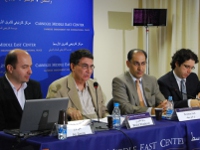Registration
You will receive an email confirming your registration.
IMGXYZ3269IMGZYXThe discovery of significant gas fields in 2009 and 2010 in the Levant Basin has created a tug-of-war between Lebanon, Cyprus, and Israel. Each country has taken steps to secure a share of the estimated 3.45 trillion cubic meters in reserves.
Ali Berro, who currently oversees administrative reform programs in the Office of the Minister of State for Administrative Reform (OMSAR), discussed the Lebanon’s administrative readiness and the upcoming challenges facing the Lebanese government. Walid Khadouri, an editor at Dar Al-Hayat, discussed the regional impact of these gas fields while Sami Atallah, director of the Lebanese Center for Policy Studies (LCPS), commented on the economic implications of the prospect of sizeable revenues. Carnegie’s Ibrahim Saif moderated.
The Looming Border Crisis
Since the discovery of the Tamar field in the Mediterranean Sea in 2009, tensions have flared between Israel and Lebanon over the demarcation of maritime borders, explained Walid Khadouri The two countries have declared overlapping boundaries in the Mediterranean Sea, each asserting its right to the reserves within their boundaries. Israel is eager for an end to its dependence on gas imports from its Middle East neighbors and both countries are interested in the potential export revenue of the sizeable reserves, Khadouri explained.
Berro and Khadouri described four factors which complicate the dispute:
- The absence of diplomatic ties: Israel and Lebanon formally remain at war.
- The lack of mutually agreed-upon land borders: Without common land borders established between Lebanon and Israel, the issue of maritime borders is more difficult.
- UN Law of the Seas Convention: Israel does not follow the principles set out by the UN convention, since it is not a signatory.
- The existence of multiple stakeholders: Recoverable gas is thought to be accessible off the Mediterranean coastlines of Lebanon, Israel, Syria, the Gaza Strip, Egypt, and Cyprus. Turkey also claims a share of fields extending to northern Cyprus.
Nevertheless, Khadouri emphasized that an escalation of the disputes is not in the interests of any of the parties, since it would hinder both exploration and production.
The Lebanese Perspective
The Petroleum Law of 2010 was a key step on the road to petroleum extraction, approving offshore exploration and specifying the contractual system to be adopted, explained Berro. He noted that Lebanon’s lack of expertise in the area of energy reserves poses a number of challenges for the government:
- Administration: Lebanon needs to develop a competitive and transparent bidding process to ensure a balance between securing profits for the state and maintaining the incentives for enterprises to continue excavating the under-explored Mediterranean Sea, Berro said. The petroleum authority must be apolitical to ensure that optimum quantities are extracted with an eye to Lebanon’s long-term interests.
- Revenue management: Gas revenues should be treated as non-renewable assets rather than income flows, Atallah added. The creation of a sovereign wealth fund is one way to commit to managing revenues in a sustainable way and avoid the volatility in fiscal spending that can accompany explosive energy prices.
- Managing the impact on other sectors: An increase in natural resource revenues is likely to lead to a decline in the competitiveness of the manufacturing and agricultural sectors, warned Atalah This can result from an appreciation of the exchange rate as inflows of foreign currency increase or a shift in resources towards non-tradable sectors, which are likely to see a higher domestic demand.
- Development and markets: In the long-term, if discoveries exceed local needs, Lebanon should map out the export possibilities and begin building the infrastructure needed to liquefy and transport natural gas, concluded Berro.
The translation of natural resources into economic prosperity should not be taken for granted. Atallah noted that while Norway doubled its per capita GDP between 1980 and 2008, that of Saudi Arabia halved in the same period. Whether the opportunities afforded by energy finds are realized or squandered depends on the quality of the political and economic institutions entrusted with their management, he concluded.
